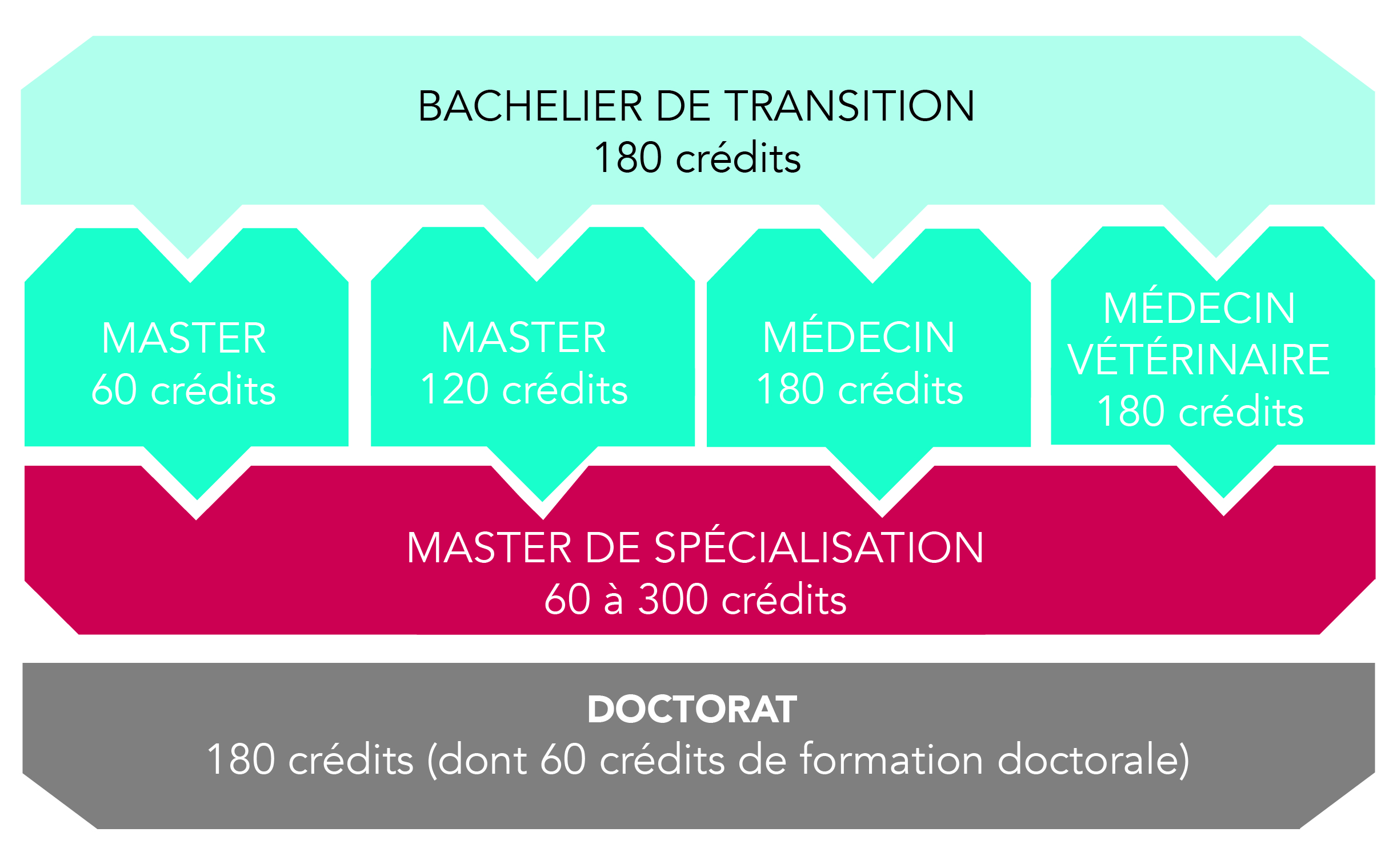Structure of Studies
Initial university training is organised in two stages:
- A “transitional” 1st cycle consisting of 180 credits leading to a Bachelor’s degree
- A “professional” 2nd cycle accounting for at least 60 credits, or 120 credits if a specialist focus is studied, leading to a Master’s degree.
Students can then complete or continue their studies with:
- A “specialist” second cycle of at least 60 credits leading to a Specialised Master’s degree
- a third cycle consisting of 180 credits, including doctoral training (leading to a research training certificate) and work related to the preparation of a doctoral thesis, leading to the title and qualification of Doctorate (PhD).
For students who wish to pursue a career in education, they have the following options:
- The Agrégation de l’Enseignement Secondaire Supérieur (AESS), which is the 30-credit teaching qualification for people who wish to teach in upper secondary education.
- The Certificat d’Aptitude Pédagogique Approprié à l’Enseignement Supérieur (Certificate of Teaching for Higher Education – CAPAES), which is the teaching qualification for people who wish to teach higher education in Hautes Écoles or at continuing education institutions.
The University of Mons also offers various continuing education courses, which are mostly Graduate Certificate programmes.
A level 6 academic qualification awarded on completion of undergraduate (first-cycle) studies comprising at least 180 credits.
This “transitional” degree (first cycle studies) is designed as a basic training programme enabling access to the Master’s programme (second cycle studies). Unlike the “professional” Bachelor’s degree, it does not give direct access to the job market.
A level 7 postgraduate degree programme (second cycle) accounting for at least 60 credits, or 120 credits if a specialist focus is studied.
120 credit Master degrees may include one or more of the following 30-credit options (specialist focuses):
- Teaching – which includes the necessary teacher training to teach in upper secondary education.
- Research – which prepares students for scientific research and includes both courses in a particular discipline and general training for the research profession.
- Specialist Focus – training in the particular discipline to which the curriculum is related with a focus on specific professional skills.
Specialised Master’s Degree: a level 7 academic degree awarded on completion of specific graduate (second-cycle) studies, awarded by a university (or universities), , by a school of arts or in co-graduation with a university or a school of arts and comprising at least 60 credits, supplementing an earlier Master’s programme.
A level 8 academic degree awarded on completion of doctoral (third-cycle) studies (PhD), which includes doctoral training and work related to the completion and defence of a doctoral thesis. To access the third cycle, a 120-credit Master’s degree is the minimum requirement.
The duration of the third cycle varies and corresponds to 180 credits.
AESS (Agrégé de l’Enseignement Secondaire Supérieur): Certificate of Teaching for Upper Secondary Education, a level 7 postgraduate teacher training qualification (second cycle), awarded by a university, and corresponding to 30 credits.
The AESS is a specialised teaching qualification for people who wish to teach in upper secondary education.
CAPAES (Certificat d’Aptitude Pédagogique Approprié à l’Enseignement Supérieur): Certificate of Teaching for Higher Education (UMONS translation) is a teaching qualification for people who wish to teach higher education in Hautes Écoles or at continuing education institutions, as a practical training specialist, assistant, professor or lecturer.
A document, which does not award the holder with an academic title, but which attests to the successful completion of a structured training programme, and details the number of credits awarded and the level of the programme. This programme must be comprised of at least 10 credits awarded by an institution of higher education.


